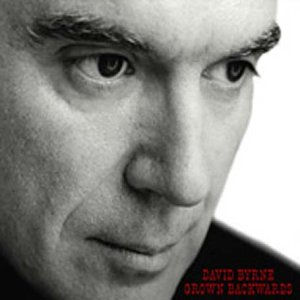Liam Carey reviews
The BBC Four Sessions: May 7th, 2004  Album: Grown Backwards
Album: Grown Backwards 
This ain’t no party, this ain’t no disco, this ain’t no fooling around.
David Byrne disbanded Talking Heads more than a decade ago, and you could be forgiven for thinking that, well, he ain’t got time for that now. Pop’s a young man’s game, after all, and it’s been 20 years since the seminal Stop Making Sense concert film perfected his “herky jerky” offbeat persona. Yet, while the hair may now be silvery the spirit remains, to invoke another classic Heads lyric, same as it ever was.
London 2004. There’s a new album, Grown Backwards, to promote and the setting is typically unusual; the Union Chapel Hall in Islington. “Hey, beer in the pews!” Byrne exclaims by way of an endearingly self-conscious opening salvo. For such an exceptional lyricist, he is not a smooth conversationalist; the words hiccup out and each inter-song chat to the audience inevitably climaxes in mutual and awkward laughter. He may find himself in a beautiful church, with a beautiful career (oops, Heads-referencing again), but when the opening bars of Nothing But Flowers come in, and that familiar nasal whine does its thing, it could be a club in New York 1984. This is David Byrne, doing what only he does best.
And therein, to an extent, lies the dilemma for fans of Talking Heads and Byrne the solo artist. Even without the considerable input and presence of messrs Harrison, Frantz and Weymouth, numbers such as Life During Wartime, Once In A Lifetime and finale Road To Nowhere simply bring the house down. Newer material from 2001’s Look Into The Eyeball album (Like Humans Do, U.B. Jesus) has a feelgood warmth and can be classed as music that you can dance to, but still lacks the extra sharpness which characterised everything his former band once did. A special mention, too, for the sensational cover of I Wanna Dance With Somebody (yes, the Whitney one!) which Byrne hoped to approach “un-ironically” and help restore its status as a “great pop song”. Mission accomplished on both counts.
Byrne’s vocal style, always something of an acquired taste, is not so suited to the ambitious interpretations of Uni Di Felice (a passage from La Traviata) or the handful of string-laden ballads from Grown Backwards that are faithfully and earnestly performed. They may be a rewarding creative experience for the man himself, but set against the selections from an illustrious back-catalogue they can be hard going at times.
Everyone probably knows a Talking Heads song, and quite a few would recognise the name or the face of their frontman. However, in 15 years of recording solo albums, of which Grown Backwards is the sixth studio effort proper, David Byrne has only returned to prominence on the one occasion; courtesy of Lazy, the inspired collaboration with X-Press 2 in 2002. It put him back in the UK Top 20 for the first time since 1986, and once again placed Byrne’s droll delivery in perfect surroundings, something which all the well-intentioned escapades into Latin music and studied skirting around on the edges of the mainstream could never quite manage.
Some tracks from Look Into The Eyeball deserve to stand alongside those by Taking Heads; The Accident and Revolution being particular solo-years highlights of the Union Chapel Hall show. Admittedly the setlist is weighted towards the past (both recent and not-so-recent), making it hard to judge the true merits of what little Grown Backwards material is aired, but rather than providing the inspiration to buy a copy of the new album (as I’d actually hoped would be the case), the experience has me immediately wanting to indulge myself in those wonderful Talking Heads CDs once more.
Review copyright © Liam Carey, 2004. E-mail Liam Carey
Reviewer of movies, videogames and music since 1994. Aortic valve operation survivor from the same year. Running DVDfever.co.uk since 2000. Nobel Peace Prize winner 2021.
